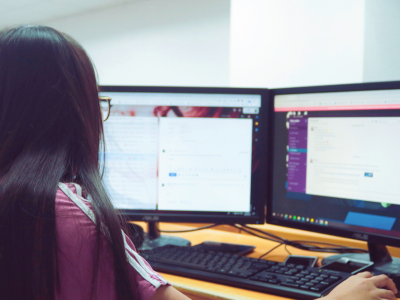The gender inequality that exists in our society not only affects 50% of its population, but also hinders development in all areas: economic, cultural, technological, etc., because in the design and creation of new works, products, and solutions, we are losing the intellectual wealth that gender diversity brings. Aware of this, the University of A Coruña (UDC) and the University of Vigo (UVigo) have launched various initiatives to highlight the existence of a gender gap in different educational and professional fields, as well as measures to reduce or mitigate it.
Some of these initiatives, those focusing on the ICT field, are channeled through the ALDABA-WIB (Women, ICT & Business) Interuniversity Chair, which both universities established in 2019 with the technology company ALDABA, with the aim of promoting and enriching the progress of ICT: on the one hand, promoting the growing participation of women in its development; and, on the other, establishing two-way channels of collaboration between the university and the company.
Specifically, as part of the initiatives to reduce the gender gap in the ICT field, the Chair made BBG-TIC (Barometer of the Gender Gap in ICT Studies) available to society, a free web tool (wib.aldaba.es/bbg-tic) that graphically reflects and allows users to consult, filtering by different criteria and time periods, the evolution of the low representation of women in ICT engineering studies, compared to other studies. BBG-TIC is constantly evolving, incorporating new data on enrollment, academic results, etc. published by public education administrations, and allows for the evaluation of whether the measures being carried out by different sectors of society to reduce the gap are successful or not.
The most recent results from BBG-TIC reveal a significant increase in female enrollment in the Computer Engineering Degree for the 2023/2024 academic year, showing a positive trend in recent years at both UDC and UVigo, with the exception of the 2022/2023 academic year. Female enrollment in the Computer Engineering Degree at the UDC, since its creation in the 2010/2011 academic year until the 2020/2021 academic year, remained between 8% and 13%, which are very discouraging figures. Female enrollment has risen from 9% in the 2020/2021 academic year to 16% in the 2021/2022 academic year and 18% in the 2023/2024 academic year, doubling the previous figures. In the Computer Engineering Degree at the University of Vigo, the data show a similar trend, although with less pronounced growth, from 13% female enrollment in the 2020/2021 academic year to 19% enrollment in the last academic year. And, at both universities, the figures reach 23% and 21%, respectively, if we include female students enrolled in the degrees in “Data Science and Engineering” and “Artificial Intelligence.”
These data may reflect a positive change in gender dynamics in the field of technology and greater openness to female participation in a field historically dominated by men. They also reflect the success of the combined efforts of different institutions and the educational community to overcome gender barriers and create an inclusive environment that promotes diversity in the field of technology. Since its establishment in October 2019, the ALDABA-WIB Chair has played an important role in this achievement, supporting and promoting specific activities to attract the interest of young women aspiring to become computer engineers.
Although these figures are encouraging and represent a positive step, they should be viewed with caution, and we will have to wait for the next academic years to confirm that this upward trend in female enrollment will continue in the future. There are still major challenges to overcome in order to achieve gender equality in computer engineering. The ALDABA-WIB Chair remains committed to addressing these challenges in order to achieve a more inclusive and diverse future in the field of computer engineering.
Below is a news item from La Voz del Galicia published on April 8, 2024, with data on the evolution of women enrolled in the FIC.



